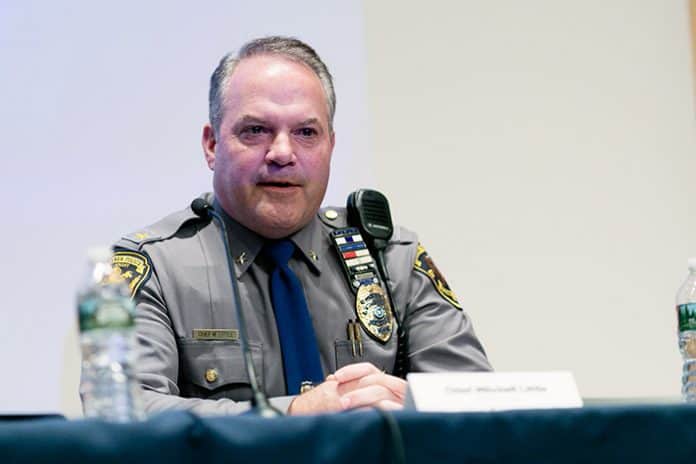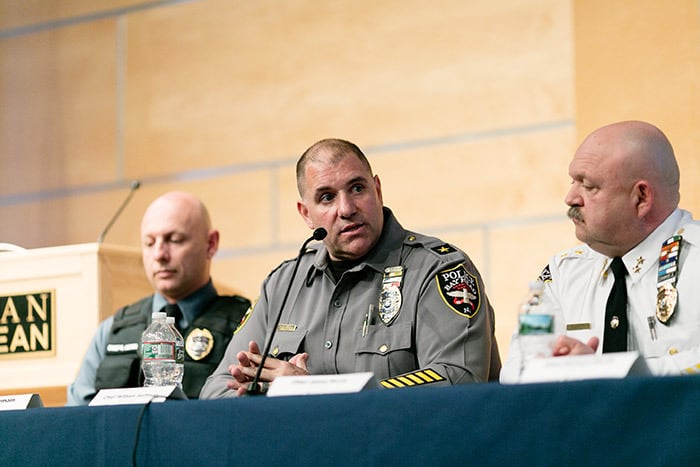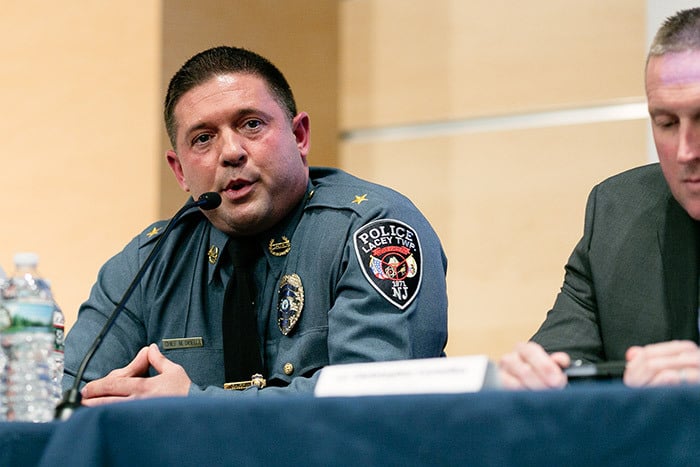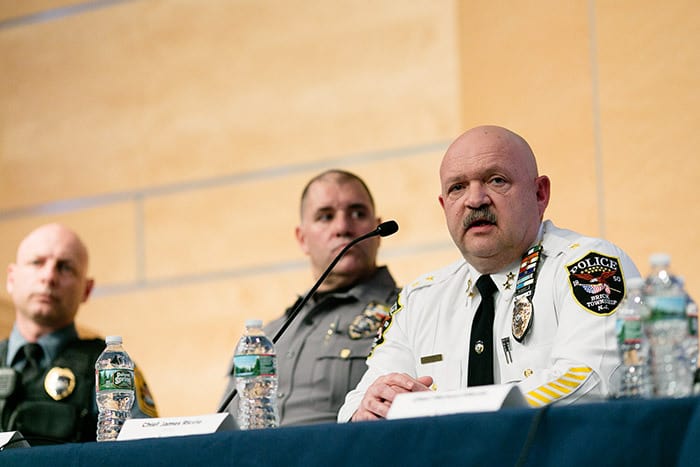
OCEAN COUNTY – Drugs and guns and related crimes. The problems facing Ocean County police haven’t changed too much from last year, when they convened for the first-ever police chiefs panel at Ocean County College. In its second year now, nine chiefs from around the county talked to criminal justice majors and the public about what’s happening in their respective towns.
“Last year, the primary concern shared across the board by each police department was the heroin epidemic. This issue was also discussed at length this year, as the officers shared how the departments have been responding to this crisis in new and innovative ways which are thankfully reducing the number of opioid related overdoses,” Jennifer Barnes, J.D., a college professor at OCC said. “The other serious issue that the officers discussed this year was ensuring the safety of students. Given the recent tragic event in Parkland, Florida, law enforcement agencies have increased their presence in Ocean County schools. The officers also indicated that additional steps would be implemented going forward to keep children safe in the classroom.”
Heroin
“If you would have told me 20 years ago—I’ve been on the job 32 years—if you told me we would be doing this for heroin addicts, I would have said you were crazy.”
Brick Township Police Chief James Riccio said the mindset in law enforcement has changed, because users have changed. Junkies aren’t creeps shooting up in dark alleyways; they are sons, daughters, mothers, fathers living in the ‘burbs, blue- and white-collar families in the grips of opioids.
While enforcement and consequences haven’t been abandoned by law enforcement, some Ocean County police departments have opened their doors for addicts to get help. Brick and Manchester were the pilot sites for the Blue HART program, an addict-recovery program run in partnership with Preferred Behavioral Health in Lakewood and Integrity House in Toms River.
The program has expanded to include Little Egg Harbor, Lacey, Ocean Gate, Point Pleasant Borough and Stafford. All a person has to do is show up on the department’s designated Blue HART day, and they will be taken to a nearby treatment center.
Riccio said his department, since last year, has had 387 people go into treatment.
“They walk into police headquarters. They’re addicted to heroin. Many times they come in and they’re worried because they’re going to be dose-sick shortly,” Manchester Police Chief Lisa Parker said. She said they do ask when the last time heroin was used, so they are prepared. “They’re scared. Heroin addicts, it is a huge step for them, because the police are ‘the bad guys.’”
When Michael C. DiBella became Lacey Township Police Chief two years ago, he knew his department had to crack down on the opioid epidemic. Nearly three-quarters or more of all crimes committed in his jurisdiction were drug-related. His department came up with a five-point plan: enforcement, education, prevention, treatment and recovery.

“Enforcement is important, it is a priority, but enforcement alone is not going to reduce the heroin epidemic,” DiBella said. “That’s a promise.”
Lt. Chris Cornelius of the Lacey Police Department said that enforcement is still important, because if enforcement isn’t pursued, “we’re going to have more and more people in recovery.”
“It takes a toll on the officers, going on these types of calls,” Lakehurst Police Chief Eric Higgins said.
Ocean County has seen a 25 percent decrease in heroin overdoses in 2017, DiBella said. Police throughout the county carry Narcan, a chemical nasal spray which can reverse a heroin overdose.
While the trend shows a decrease in overdose deaths, and connectedly, a decrease in crimes such as shoplifting, schools and police departments continue to work together to create or improve their drug prevention programs. School resource officers have been installed in some districts, while those who have had officers in schools tap them to be more involved in such training of staff and students. Departments that have drug prevention and education programs in school do use D.A.R.E. or L.E.A.P. In Lacey, their high school resource officer does teach alcohol and drug awareness and prevention.
“We have an outstanding SRO in our school district, and it starts with him. We have to get to the kids when they’re young,” Point Pleasant Beach chief Joseph A. Michigan said.
Guns and school safety
The murder of 17 students and faculty in Parkland, Florida on Feb. 14 was fresh in everyone’s minds.
“Teachers need to teach, and law enforcement needs to be law enforcement,” Toms River Police Chief Mitch Little said. “There’s no doubt in my mind people can be trained to shoot a target, but they don’t have the length of time and experience they would need when faced with combat-type situations. They’re not doing tactical shootings. It’s not in their mindset. Just like every profession needs to be experts in their profession, and I think that’s where it should stay.”
All the chiefs quietly agreed with Little.
“There’s always going to be a battle about gun control,” Bay Head Police Chief William Hoffman said during Q&A time. “And I always tell everybody, guns do not kill people. People kill people. And if you like that or not, it’s the truth.”

Higgins’ daughter attends college in Florida. Her college roommate graduated from Marjory Stoneman Douglas High School last year.
“What do we do? We take the lessons learned from down in Florida and we bring it back to our agencies and to our school,” Higgins said. Lakehurst has a K-8 school. “We’re currently in the process of reviewing our school security procedures and protocols.”
Point Pleasant Beach had one SRO and three schools. Now each school has an SRO until the end of the year, “to try to ease the calm of our families, parents, that send their kids to school and expect them to come home every day and be safe,” Michigan said.
He brought another problem, that of church safety and security. On Nov. 5, 2017, Devin Patrick Kelley stormed the First Baptist Church is Sutherland Springs, Texas, killing 26. That shooting prompted many church leaders in Point Pleasant Beach to reach out to the police department. “What are we doing to secure our churches, which is a soft target?”
Michigan and Stafford Police Chief Thomas Dellane organized training provided by New Jersey Homeland Security for church leaders in those respective towns.
For Riccio, it’s a three-part problem: mental illness, the availability of weapons, and victims. Mental illness will never be completely eradicated, and eliminating all guns will never happen, so the best approach is to lessen the likelihood of anyone becoming a victim.
“But I think we’re all missing the boat, and there seems to be a common theme. Post-shooting, you hear people that are interviewed saying, ‘Yeah, you know that guy? If anybody was going to shoot up the school, it would be him.’ Well, why are we holding on to that information?”
In Brick, the police department has a psychologist who is on retainer. Riccio asked him to teach the department what signs to look for to identify someone who may act out violently. The police will be trained first, and then the program will expand to school staff and students. But why isn’t such behavior being reported?

“I’ll tell you why. Because we’re so politically correct now, that teachers are probably afraid to report things, because ‘bizarre’ has become ‘the new normal.’ Any type of behavior, anything goes. They’re probably afraid, because if they were to report that person, and they’re wrong, or they’re perceived to be wrong, they’re probably afraid they’re being biased, prejudice, or what have you,” Riccio said. “So we need to overcome that fear.”
New Barnegat Police Chief Keith Germain was also in attendance.
“I think it is an invaluable opportunity for the criminal justice students to hear directly from officers about what it is like to be in law enforcement today. First-hand knowledge about a profession is such a wonderful chance to learn more about the job they hope to secure one day. The officers who generously attended the panel discussion are incredible role models for the students – they positively influenced the next generation of police men and women by sharing their thoughts and experiences. I hope that upon the conclusion of the panel discussion, the audience left with a firm understanding that law enforcement officers in Ocean County take their responsibly of keeping residents safe very seriously, and that they are dedicated to protecting the public,” Barnes told Jersey Shore Online.







